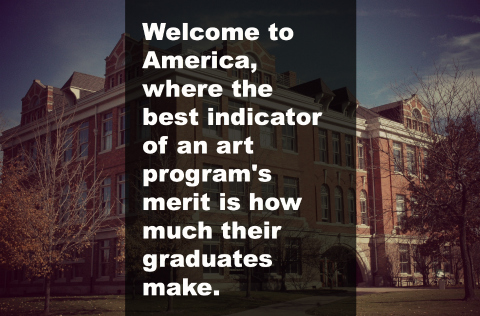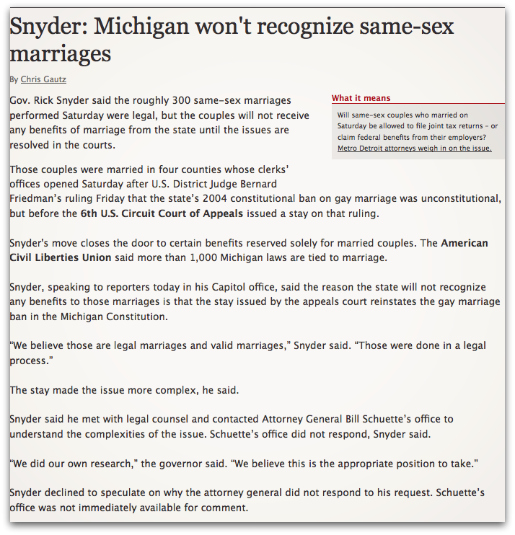A friend in Portland sent me a text this morning. He wanted to let me know that Eastern Michigan University (EMU) had made a list in the Atlantic. Sadly, it’s a list of universities that are the biggest waste of money. Specifically, they claim data exists to show that Art majors graduating from EMU will never make enough to justify the $93,840 cost of their four-year degree. (That, according to their research, is the four-year in-state cost for those not receiving scholarships, etc.)
As I’m not a statistician, and as I haven’t seen the raw data they’re basing their analysis on, I don’t feel up to the task of debating the issue, but, as it seems that their findings are based on self-reported data submitted by way of a website called PayScale.com, my sense is that it’s probably not the most academically rigorous of studies. They don’t, for instance, even say how many graduates of the EMU Art program contributed their earning data, and for how many years post graduation. So, this finding of theirs, as I understand it, could be based on one student who entered his/her earnings for just the first year out of school, which one would assume to be low. And, of course, as entries are anonymous and unverified, it’s conceivable that this is all fiction to begin with. (I can’t even find “Art” listed as one of the majors tracked on the PayScale.com page for EMU.) But, as it was posted on the internet, and is now being shared widely on Facebook, it’s something that we need to at least acknowledge and discuss.
Personally, I think that EMU would have cause to go after PayScale.com, and the Atlantic, for releasing this nonsense as though it’s fact, but, for the sake of argument, let’s say it’s true. Let’s say, as they suggest, that graduates of the EMU undergraduate art program, after 20 years time, are -$118,000 worse off than high school graduates who chose not to attend college, which I believe is their contention… So what?
I object to the whole underlying premise that all academic pursuits should be boiled down to their earning potential. Given the state of today’s economy, I know students need to give some thought as to how they’ll pay their bills after graduation, but I don’t accept the notion that we shouldn’t teach art as it doesn’t make people wealthy. A culture that thinks that way, in my opinion, is doomed… And, perhaps more importantly, an artist who gets into the field to make a lot of cash likely doesn’t have anything very interesting to say with his or her work in the first place.
update: Colin Blakely, the head of the EMU Art Department, has responded to this article. Here’s his letter to the Atlantic:
I work in a university art department. In the current climate of emphasis on STEM-based education and employment rates upon graduation as a critical metric in determining the effectiveness of University programs, I am used to feeling like my educational values are at odds with the conventional wisdom. So I was not surprised to see that Arts majors were nowhere to be found in The Atlantic’s article “Which College- and Which Major- Will make You Richest?” (nobody goes into the arts to become rich). Nor did I react with anything more than resignation when the companion article “These U.S. Colleges and Majors are the Biggest Waste of Money” prominently featured majors in the Arts. However, I was unprepared for the double shot of seeing the Arts majors at my own institution make the top of the list. A simultaneous attack on both the discipline and the institution that I have come to love and believe in wholeheartedly took some time to get over. It didn’t make sense. Every day I experience first-hand the quality of our programs and the faculty that breathe life into them. I see the perseverance of our students in their ability to become masters of their chosen tools and solve complex problems with an amazing degree of originality. I watch as our graduates go on to successful jobs at prestigious design firms, public education institutions, and blue chip corporations such as IBM or Whole Foods. Many progress quickly out of entry-level positions into managerial ones, or become entrepreneurs. How do I reconcile this day to day experience with an assessment that claims a major in this same department to be not only worthless, but in fact a “waste of money.”
I’ve looked at PayScale’s data collection and reporting methods. It would be easy to take comfort in picking apart this data and declaring it flawed and/or irrelevant. The return on investment calculations used as the foundation for the article are based on the earnings potential of someone who graduated in 1994. I could thus simply assume that our department today is not the same one it was back then. We’ve added a Professional Practices/Capstone class that helps students focus on the tools they need for successful careers. We’ve developed a closer relationship with the Career Development Center. In addition, I suspect that the sample size used to make this calculation (EMU Arts majors graduating in 1994 who responded to the salary survey) is sufficiently small as to create heavily skewed or even irrelevant results. In short, I don’t believe for one second in the validity of our ranking.
However, none of this solves what I see as the bigger problem: the arts are currently under fire in higher education. The number of majors is dropping nation-wide. We are literally the butt of jokes: our own nation’s president has taken a jab at the Art History major by using it as an example of what he sees as the antithesis of a high-paying major. There is a national conversation going on about the importance of teaching employable skills to college students, and the arts are nowhere to be found.
Some of this is our own fault. As educators we take for granted the skills our graduates possess. I’m not talking about the ability to effectively handle paint or mold from clay, but the more transferable skills. For example, a prowess with visual communication (we live in a world where image is everything), creative problem solving, critical thinking, dealing effectively with ambiguity, problem solving through experimentation, inventing new ways to work within existing systems. In short, they possess the ability to take any given situation and look at it not for what it is, but what it could be: an ability to imagine the possibilities. Any employer would put these qualities high on a list of things they look for in an employee, and these are all things that come second-nature to a student in the arts. However, it is less common to find students with the explicit knowledge that they possess these skills. This is where we as educators come in.
We’ve done incredible work in helping our students along, but seem to have fallen short in one critical area: teaching them to imagine the possibilities for themselves. When someone asks me what they can do with an art major, my response is simple: anything you want. This answer is of course both inspiring and infuriating. But then, as I’ve already mentioned, artists are pretty good at dealing with ambiguity.
-Colin Blakely
Professor and Department Head
Art Department
Eastern Michigan University
















